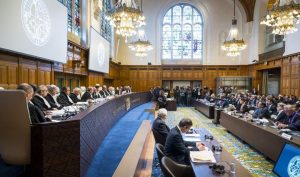A comment on R (on the application of A and B) v Secretary of State for Health [2017] UKSC 41.
By Dr Sheelagh McGuinness, Senior Lecturer in Law (University of Bristol Law School) and Prof Keith Syrett, Professor of Law (University of Cardiff, School of Law and Politics).
 The start of June 2017 saw abortion law in Northern Ireland (NI) making the news for several reasons. On June 9th, Theresa May announced that she intended to try and form a government with the Democratic Unionist Party (DUP). Members of this radically conservative party from NI have long been vocal in their opposition to abortion. Some feared that restrictions on abortion legislation might form part of negotiations between the two parties. On June 13th, the Department of Health published ‘The Report on abortion statistics in England and Wales for 2016’ which contained details on the number of women who travelled from NI to England to access abortion care. Then, on June 14th, the Supreme Court handed down an important decision on NHS funding for women who travel from NI to England to access abortions. These women, save in exceptional cases, must pay for abortion care privately, notwithstanding their status as UK citizens and (in many cases) UK taxpayers. In this blog we examine the Supreme Court decision and the context within which women travel from NI to have abortions in England.
The start of June 2017 saw abortion law in Northern Ireland (NI) making the news for several reasons. On June 9th, Theresa May announced that she intended to try and form a government with the Democratic Unionist Party (DUP). Members of this radically conservative party from NI have long been vocal in their opposition to abortion. Some feared that restrictions on abortion legislation might form part of negotiations between the two parties. On June 13th, the Department of Health published ‘The Report on abortion statistics in England and Wales for 2016’ which contained details on the number of women who travelled from NI to England to access abortion care. Then, on June 14th, the Supreme Court handed down an important decision on NHS funding for women who travel from NI to England to access abortions. These women, save in exceptional cases, must pay for abortion care privately, notwithstanding their status as UK citizens and (in many cases) UK taxpayers. In this blog we examine the Supreme Court decision and the context within which women travel from NI to have abortions in England.
The case
In 2012 A, a 15-year-old girl, became pregnant. She did not want to continue with the pregnancy and with the support of her mother, B, arranged to have a termination in England. A and B were surprised to find out that as A was resident in NI she would have to pay for the termination in England. Believing this to be unfair B, on A’s behalf, started proceedings to challenge the lawfulness of this policy. Their challenge contained two key claims. First, that the Secretary of State for Health was acting unlawfully in refusing to permit women from NI to access NHS funded abortions [the public law claim]. Second, that women in NI were being discriminated against as compared to other women in the UK [the human rights claim].
A and B were unsuccessful in the High Court and in the Court of Appeal. Their appeal to the Supreme Court was dismissed by a majority of 3:2. (more…)







